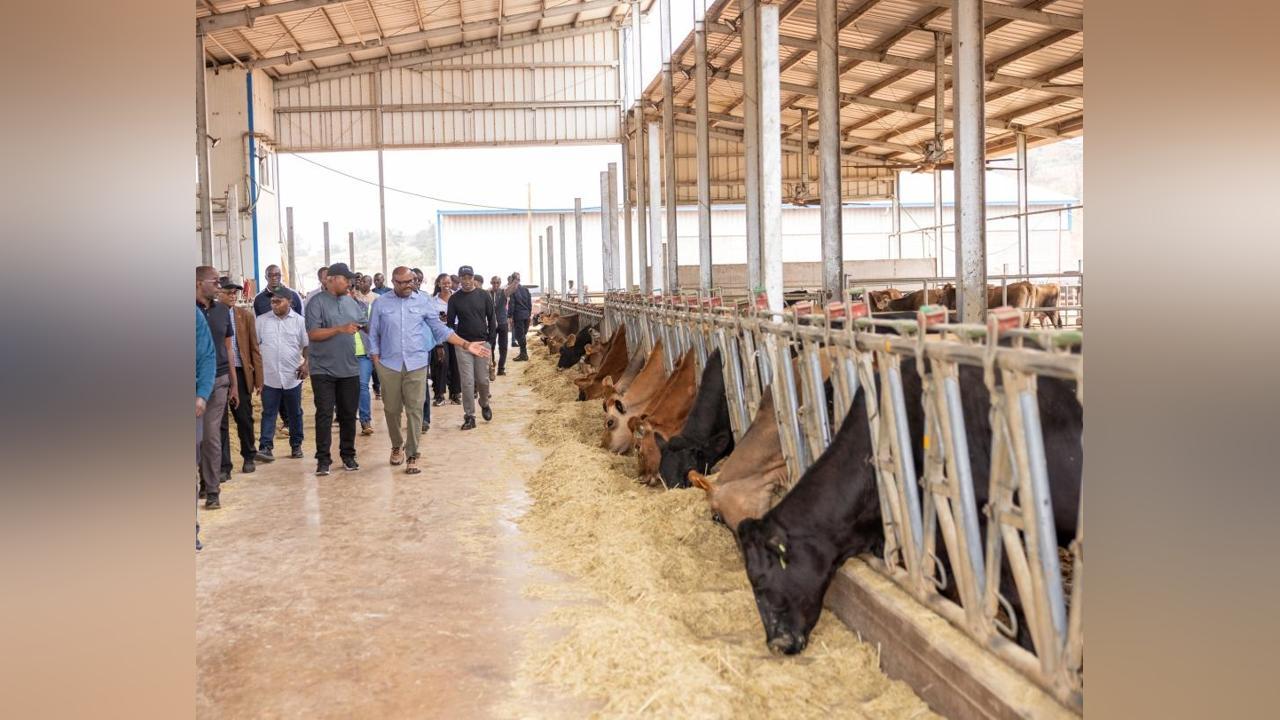Patient Byiringiro
Africa-Press – Rwanda. Agriculture has long been the heartbeat of Rwanda’s economy. It employs more than six in every 10 Rwandans, contributes about a quarter of the national GDP, and sustains households across the country. But as Rwanda looks toward Vision 2050, the limitations of subsistence farming are clear. The sector must evolve to become more productive, market-oriented, and resilient in the face of climate change and a rapidly growing population.
This is why the Government of Rwanda, under the National Strategies for Transformation (NST1 and NST2), prioritized agricultural transformation. One flagship initiative born from this vision is the Gabiro Agribusiness Hub (GAH), designed to demonstrate how modern agribusiness can power economic growth, social progress, and national food security.
The idea of Gabiro Agribusiness Hub first took shape in 2016, when the Government of Rwanda partnered with Netafim, a global leader in smart irrigation from Israel. An MoU signed in 2017 formalized the project’s scope, and by 2019, GAH Ltd was established as a joint venture to bring the vision to life. Since then, the hub has grown into one of Rwanda’s most ambitious agricultural projects, representing both a technological leap and a bold policy experiment.
The Gabiro Agribusiness Hub project covers 16,000 hectares, with water drawn from Akagera River through advanced irrigation systems that maximize efficiency and sustainability. Phase I, spanning 5,600 hectares, is expected to be commissioned later this year, while Phase II will expand the project to approximately 15,600 hectares.
Building a modern hub
Gabiro is not only about expanding farmland.
Its mission is to create an enabling environment for private investment, modernize agricultural value chains, and set a standard for climate-smart farming in Rwanda. Investors at the hub benefit from high-quality infrastructure including roads, power, and water delivered to their plots at high pressure allowing them to focus on production. The hub also includes a demonstration farm that introduces local farmers to modern techniques, ensuring knowledge transfer and inclusivity.
Transforming lives and communities
The impact of Gabiro will be felt far beyond its boundaries.
Once Phase I is fully operational, farmers will enjoy higher yields and more stable incomes. With irrigation in place, year-round farming will replace dependence on seasonal rains, enabling crop diversification and reducing food shortages. Affordable food prices will improve household nutrition, while jobs will multiply both on family farms and within agribusinesses operating in the hub.
Importantly, Gabiro is also ensuring that communities are not left behind. Farmers whose land was incorporated into the hub have received compensation and resettlement, while community plots have been set aside to guarantee continued participation. Annual lease fees are paid directly to landowners, providing a steady income stream in addition to agricultural opportunities.
Aligned with national and global goals
Establishment of Gabiro Agribusiness Hub is tightly aligned with Rwanda’s broader development agenda.
It supports Vision 2050 by strengthening agricultural value chains so that Rwanda does not stop at food production but also processes and exports. It directly advances the goals of the Strategic Plan for Agriculture Transformation (PSTA IV), which emphasizes commercialization, irrigation, and private sector engagement.
The hub also positions Rwanda as a regional leader in climate-smart agriculture. By adopting drip irrigation and efficient water management systems, Gabiro addresses one of the most pressing challenges of African agriculture – low yields due to erratic rainfall. Studies show that irrigated farming can more than double yields compared to rain-fed agriculture, a transformation Gabiro is bringing to life.
Globally, Gabiro contributes to the Sustainable Development Goals, especially zero hunger, climate action, and inclusive economic growth. It is a demonstration of how public-private partnerships can deliver impact on multiple fronts: productivity, sustainability, and equity.
An investment with returns
Beyond its social and environmental impact, Gabiro is financially sustainable.
It is not only a development project but also an attractive investment model. Investors have already leased land and secured contracts with buyers for their produces, signaling confidence in Rwanda’s agricultural future.
Looking ahead
The future of Gabiro will not only be measured in hectares irrigated but in the creation of a complete agricultural ecosystem.
Phase II will add agro-processing plants, storage facilities, and stronger market linkages to connect farmers directly to buyers. Equally important is the empowerment of smallholder farmers through training and skills development so that they remain active participants in this transformation.
Gabiro Agribusiness Hub is ultimately an investment in Rwanda’s future. It represents a bold step toward modern, inclusive, and resilient agriculture. It is a system that will feed the nation, attract private investment, and position Rwanda as a leader in regional agribusiness. In many ways, Gabiro reflects the Rwandan spirit itself: determined, forward-looking, and unafraid to turn vision into reality.
Source: The New Times
For More News And Analysis About Rwanda Follow Africa-Press






